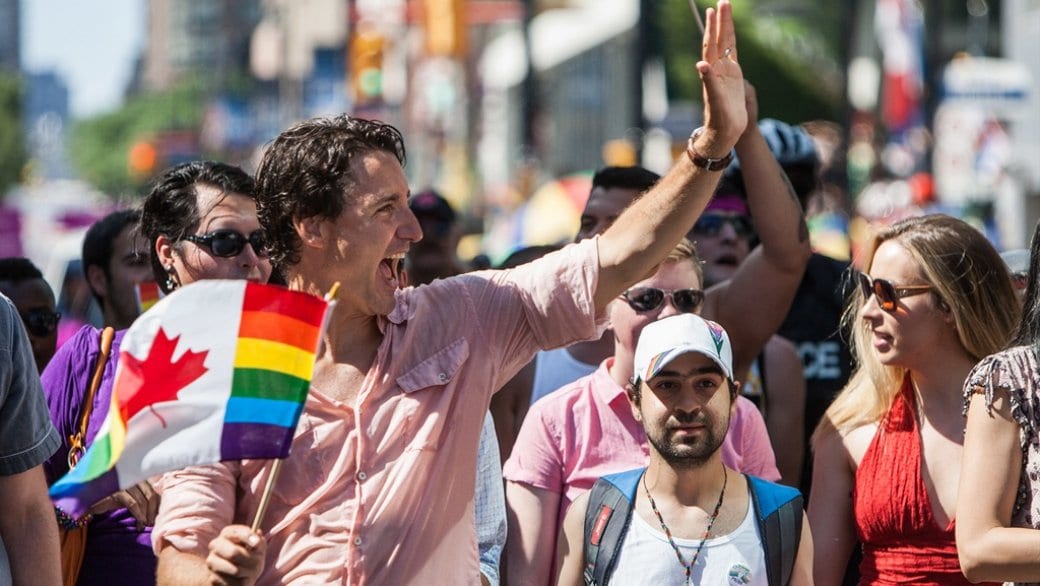It’s hard to overstate how thirsty for change Canada’s LGBT community was after a decade under Harper, so when Justin Trudeau came to power at the end of 2015, many were optimistic that our photogenic PM would usher in a golden age for queer Canadians.
And while some people — including, on several occasions, this author — were skeptical that Trudeau would live up to his own hype, 2016 did in fact turn out to be quite a year of progress.
For the first time, the prime minister — and much of the federal cabinet — marched in a Pride parade.
But much of the progress should be attributed to Justice Minister Jody Wilson-Raybould, who has taken the lead on several key files. Most prominently, she stickhandled the speedy passage of Bill C-16, the trans rights bill, through the House of Commons, after a decade of failed attempts. The bill faces an unclear future in the Senate, but Xtra’s Ottawa reporter feels pretty confident it will pass.
Wilson-Raybould is also responsible for introducing Bill C-32, which will finally remove the anal sex prohibitions from the Criminal Code, finally completing the decriminalization process that started under Pierre Trudeau. With minimal opposition from the Conservatives, this bill should also sail through in the new year.
And just last week, Wilson-Raybould announced that she was taking the lead to end the criminalization of HIV, through the development of prosecutorial guidelines. This will be a major challenge, as there is no simple statute that can be amended or repealed. She’ll have to work with her provincial counterparts to get agreement on how to handle HIV-transmission cases, and even then, it will be difficult to stop police and Crown attorney actions, given the hash the Supreme Court has made of the law.
While these actions are welcome, Wilson-Raybould still has her work cut out for her going into 2017. The Liberals have made little apparent progress on amending the Conservatives’ hated spying bill, C-51. There has similarly been no apparent action on the Conservatives’ likely unconstitutional anti-sex work law, which just last year, Wilson-Raybould told Xtra she was “committed to reviewing.”
And there remains the sticky issue of an apology and expunging of records of men convicted under historic sodomy laws, which has been passed to Trudeau’s new special advisor on LGBTQ issues, MP Randy Boissonnault.
However, the Liberals’ approach to the gay blood donor ban remains as a major black mark on their record. While they pledged during the election to end the ban entirely, they weakly reduced it to a one-year deferral period instead. Health Minister Jane Philpott says the ministry is continuing to review the deferral period with a view to ending the ban outright, but this still smells like a broken promise.
It has to be noted that the sea change in attitudes to LGBT rights has also seeped into the Conservative party and even its provincial cousins. In 2016, the federal Conservatives finally ended their formal opposition to same-sex marriage, and only a minority of members opposed the federal trans rights bill. The BC Liberals also passed a trans rights bill, and Ontario’s PCs spent much of the year tied in knots over their new leader’s newfound desire to stand up for LGBT rights. Depoliticizing our basic rights is probably the most welcome change.
At the provincial level, trans rights bills passed in BC and Quebec, and governments in Nunavut and Yukon are working on trans rights bills as well. This will leave only New Brunswick without an explicit trans human rights law.
Meanwhile, Ontario’s Liberals continued to press their inclusive sex-ed program and passed a landmark law to extend protections and recognitions for LGBT families. That also dovetails with the federal consultations on updating the regulations around assisted reproduction.
In the broader community, 2016 is also the year when intersectionality went mainstream. The work of Black Lives Matter Toronto and the discussion it sparked with its protest at Toronto Pride is the most revolutionary action of year, and the group should be commended for reminding the community of battles yet to be won.
Looking ahead and abroad, Canadian LGBT people will also face a deeper international struggle for queer rights. Indeed, by mid-2017, Trudeau may be the only leader of a G-7 nation that stands as progressive on LGBT rights. Striking as it is to say, the global LGBT community may have to rely on Trudeau’s leadership to champion our causes, if the United States and Europe start to shrink from LGBT issues.
This story is part of Xtra’s A Year in Review news picks for 2016.
Editor’s note, Dec 17, 2016: An earlier version of this story referred to the justice minister’s surname as Raybould. It has been corrected as Wilson-Raybould.


 Why you can trust Xtra
Why you can trust Xtra


